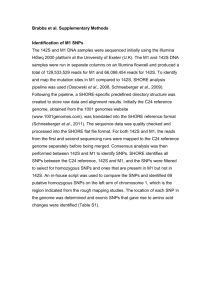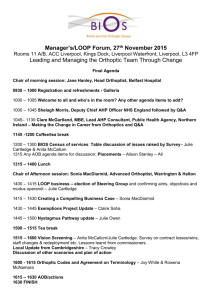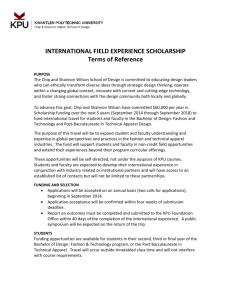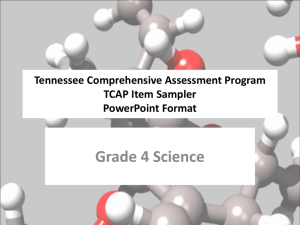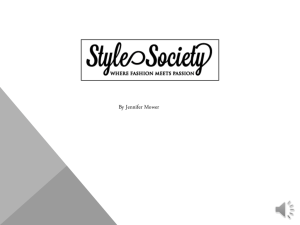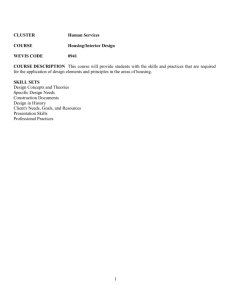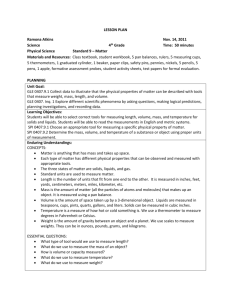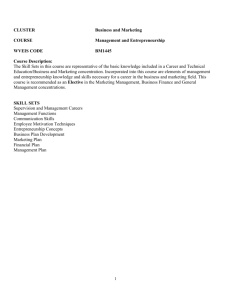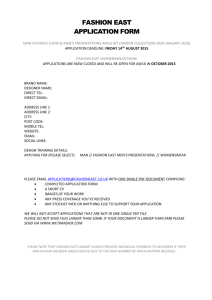skill sets - Career and Technical Education
advertisement
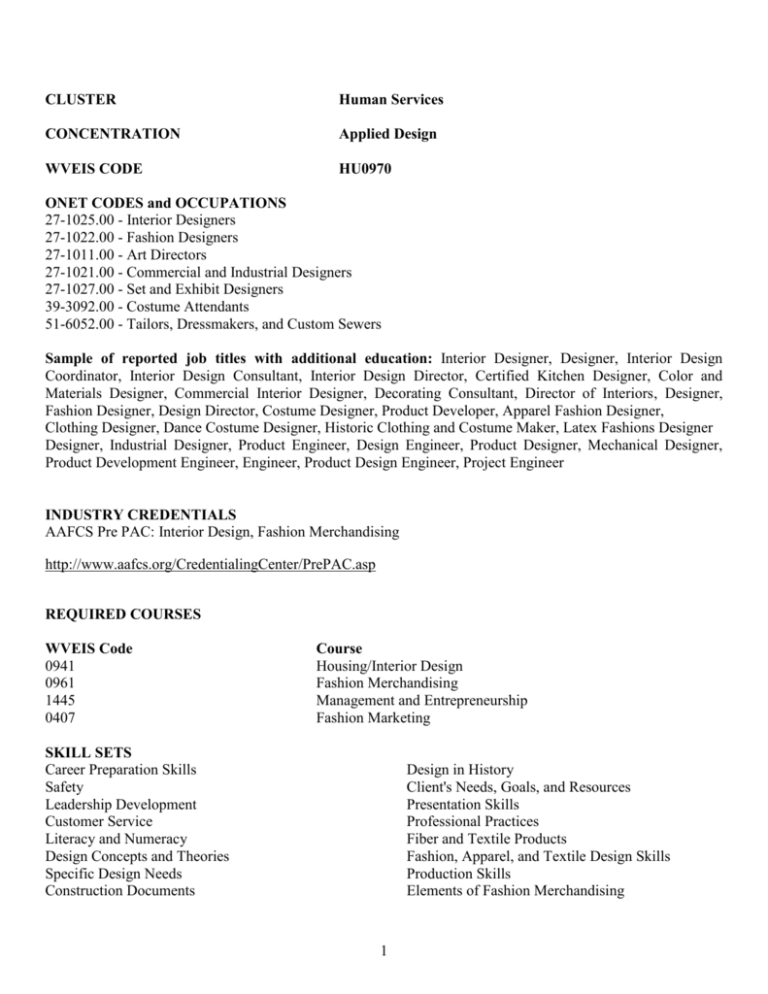
CLUSTER Human Services CONCENTRATION Applied Design WVEIS CODE HU0970 ONET CODES and OCCUPATIONS 27-1025.00 - Interior Designers 27-1022.00 - Fashion Designers 27-1011.00 - Art Directors 27-1021.00 - Commercial and Industrial Designers 27-1027.00 - Set and Exhibit Designers 39-3092.00 - Costume Attendants 51-6052.00 - Tailors, Dressmakers, and Custom Sewers Sample of reported job titles with additional education: Interior Designer, Designer, Interior Design Coordinator, Interior Design Consultant, Interior Design Director, Certified Kitchen Designer, Color and Materials Designer, Commercial Interior Designer, Decorating Consultant, Director of Interiors, Designer, Fashion Designer, Design Director, Costume Designer, Product Developer, Apparel Fashion Designer, Clothing Designer, Dance Costume Designer, Historic Clothing and Costume Maker, Latex Fashions Designer Designer, Industrial Designer, Product Engineer, Design Engineer, Product Designer, Mechanical Designer, Product Development Engineer, Engineer, Product Design Engineer, Project Engineer INDUSTRY CREDENTIALS AAFCS Pre PAC: Interior Design, Fashion Merchandising http://www.aafcs.org/CredentialingCenter/PrePAC.asp REQUIRED COURSES WVEIS Code 0941 0961 1445 0407 Course Housing/Interior Design Fashion Merchandising Management and Entrepreneurship Fashion Marketing SKILL SETS Career Preparation Skills Safety Leadership Development Customer Service Literacy and Numeracy Design Concepts and Theories Specific Design Needs Construction Documents Design in History Client's Needs, Goals, and Resources Presentation Skills Professional Practices Fiber and Textile Products Fashion, Apparel, and Textile Design Skills Production Skills Elements of Fashion Merchandising 1 General Operational Procedures Functions of Management Management Communication Skills Employee Motivation Entrepreneurship Marketing Plan Management Plan Retail Marketing and Merchandising Principles of Selling Principles of Promotion Fashion Market Centers and Designers Communication Skills Skills in Customer Service Management Risk Management 2 Career Preparation, Safety, Leadership Development, Customer Service and Literacy and Numeracy skill sets should be integrated throughout the concentration as remaining skill sets are delivered. Skill Set Knowledge Objectives HU.1 Performance Objectives HU.2 HU.3 HU.4 HU.5 HU.6 HU.7 HU.8 HU.9 HU.10 Skill Set Knowledge Objectives HU.11 Performance Objectives HU.12 HU.13 HU.14 HU.15 HU.16 HU.17 HU.18 HU.19 HU.20 Skill Set Knowledge Objectives HU.21 Performance Objectives Career Preparation Skills Students will demonstrate knowledge of career paths. goal development and achievement. attitudes and work habits that support career retention and advancement. personal qualities and abilities needed to be effective with children. communication in varied contexts. Students will relate skills and abilities to possible career pathways. explain methods of goal development. discuss methods of time management and task coordination. practice professionalism in punctuality, appropriate dress, task completion, etc. investigate methods of supervision such as giving and receiving feedback and instruction. develop and present a statement of their personal work ethic beliefs. prepare an application, cover letter, resume and thank you letter. create a personal portfolio for use when applying for employment. practice simulated job interviews. Safety Students will demonstrate knowledge of safety practices, policies, procedures and strategies related to both personal and environmental safety. Students will define personal and environmental safety on the job. analyze the legal responsibility to provide a safe environment. anticipate and avoid or mitigate potential safety risks for self and client. list health and safety tools of the trade and assemble a safety kit. plan safe and appropriate responses to a variety of dangers and emergencies. identify options for further preparedness training and research. identify causes, prevention and treatments for injuries. list responsible actions to create a safe and healthy environment. demonstrate proficiency in first aid, CPR and AED. Leadership Development Students will demonstrate knowledge of public speaking. parliamentary law. leadership concepts. characteristics of effective teams and organizations. Students will 1 HU.22 HU.23 HU.24 HU.25 HU.26 Skill Set Knowledge Objectives HU.27 Performance Objectives HU.28 HU.29 HU.30 HU.31 HU.32 HU.33 HU.34 HU.35 HU.36 HU.37 HU.38 HU.39 Skill Set Knowledge objectives HU.40 Performance Objectives develop and deliver speeches. participate in business meetings. attend leadership conferences and training (local, state and/or national). volunteer in community service opportunities. participate in career development events. Customer and Personal Service Students will demonstrate knowledge of skills and procedures in customer and guest services. interpersonal skills to build effective working relationships. social perceptiveness by being aware of others' reactions and understanding why they react as they do. Students will assess customer needs. meet quality standards for service. evaluate customer satisfaction. demonstrate concern for others. use good manners and show cooperation. work with diverse people by being flexible and open-minded. negotiate with others to resolve conflicts and settle disputes. maintain open communication with others. accurately interpret the verbal and non-verbal behaviors of others; base actions appropriately. respect diversity by demonstrating respect for, listening to, and considering the opinions, perspectives, customs, and individual differences of others. Literacy and Numeracy Students will demonstrate knowledge of literacy and numeracy skills required to solve complex real-world problems associated with their career/technical content area improve their thinking and reasoning skills. Students will HU.41 HU.42 HU.43 HU.44 utilize a variety of technical sources (e.g., Internet, manuals, journals, directions, reports, etc.) to complete career/technical assignments and projects demonstrate writing skills required to complete career/technical assignments and projects demonstrate accuracy in calculating and measuring graphical work required to complete career/technical assignments and projects analyze tables, charts, graphs and multiple data sources to complete career/technical assignments and projects 2 Housing/Interior Design Skill Set Knowledge Objectives 0941.1 Performance Objectives WVEIS 0941 Design Concepts and Theories Students will demonstrate knowledge of housing and design concepts and theories, including green design. available resources and options. Students will 0941.2 0941.6 evaluate the use of elements and principles of design in housing and commercial and residential interiors. analyze the psychological impact that the principles and elements of design 0941.3 have on the individual. analyze the effects that the principles and elements of design have on 0941.4 aesthetics and function. apply principles of human behavior such as ergonomics and 0941.5 anthropometrics to design of housing, interiors, and furnishings. Skill Set Specific Design Needs Knowledge Objectives Students will demonstrate knowledge of Performance Objectives housing and interior design knowledge, skills and processes to meet specific design needs. Students will 0941.7 0941.8 0941.9 0941.10 0941.11 0941.12 0941.13 0941.14 analyze product information, including but not limited to floor coverings, wall coverings, textiles, window treatments, furniture, lighting fixtures, kitchen and bath fixtures and equipment. evaluate manufacturers, products, and materials considering environmental protection, care and maintenance, and safety issues. select or design, and make mock purchase of furnishings, art works, and accessories. demonstrate measuring, estimating, ordering, purchasing, pricing, and repurposing skills. appraise various interior furnishings, fixtures, appliances, and equipment to provide cost and quality choices for clients. examine the impact of housing, interiors, and furnishings on the health, safety, and welfare of the public. demonstrate design processes such as determining the scope of the project, programming, research, concept development, proposal, schematic design, design drawing, and design presentation development. formulate environmental plan to be practical, esthetic, and conducive to intended purposes, such as raising productivity or selling merchandise. 3 Skill Set Knowledge Objectives 0941.15 Performance Objectives 0941.16 0941.17 0941.18 0941.19 0941.20 0941.21 Skill Set Knowledge Objectives 0941.22 Performance Objectives 0941.23 0941.24 0941.25 0941.26 0941.27 Skill Set Knowledge Objectives 0941.28 Performance Objectives Construction Documents Students will demonstrate knowledge of design, construction document reading, and space planning skills required for the housing, interior design and furnishings industries. Students will interpret information provided on construction documents. evaluate floor plans for efficiency and safety in areas including but not limited to zones, traffic patterns, storage, and electrical, and mechanical systems. draft an interior space to scale using architecture symbols. arrange furniture placement with reference to principles of design, traffic flow, activity, and existing architectural features. apply building codes, universal guidelines, and regulations in space planning and furniture arrangement. demonstrate graphic communication skills (CAD, powerpoint, sketching). Design in History Students will demonstrate knowledge of design and development of architecture, interiors, and furnishings through history. future design and developing trends. Students will describe features of furnishings that are characteristic of various historical periods. explain societal and technological trends on periods of architecture and interior design through the ages. illustrate the development of architectural styles throughout history. compare and contrast historical architectural details to current housing and interior design trends. analyze future design and development trends in architecture, interiors, and furnishings. Client's Needs, Goals, and Resources Students will demonstrate knowledge of client's needs, goals, and resources in creating design plans for housing and residential and commercial interiors. Students will 0941.29 0941.30 0941.31 confer with client to determine factors affecting planning interior environments, such as budget, architectural preferences, and purpose and function. advise client on interior design factors such as space planning, layout and utilization of furnishings or equipment, and color coordination. assess financial resources needed to improve interior space. 4 0941.32 0941.33 0941.34 0941.35 0941.36 Skill Set Knowledge Objectives 0941.37 Performance Objectives 0941.38 0941.39 0941.40 0941.41 assess client's community, family, and financial resources needed to achieve housing and interior design goals. assess a variety of available resources for housing and interior design, including ergonomic and anthropometric data. critique design plans to address client's needs, goals and resources. justify design solutions relative to client needs, including diversity and cultural needs, and the design process. estimate material requirements and costs, and present design to client for approval. Presentation Skills Students will demonstrate knowledge of design knowledge, skills, processes, and theories. oral, written, and visual presentation skills to communicate design ideas. Students will select appropriate studio tools. prepare sketches, elevations, and renderings using appropriate media. prepare visual presentations including legends, keys, and schedules. utilize a variety of presentation media such as photography, video, computer, and software for client presentations. 0941.42 utilize applicable building codes, universal guidelines, and regulations in space planning. 0941.43 render design ideas in form of paste-ups or drawings. 0941.44 use computer-aided drafting (cad) and related software to produce construction documents. Skill Set Professional Practices Knowledge Objectives Students will demonstrate knowledge of 0941.45 Performance Objectives professional practices. procedures for business profitability and career success. the role of ethics in the housing, interiors and furnishings industries. Students will 0941.46 0941.47 0941.48 0941.49 0941.50 0941.51 consult with other professionals, such as contractors, architects, engineers, and plumbers, to ensure job success. examine legislation, regulations, and public policy that affect residential and commercial interior design as well as the housing and furnishings industries. analyze personal and employer responsibilities and liabilities regarding industry related safety, security, and environmental factors. describe security and inventory control strategies, laws and regulations, and worksite policies and procedures that affect loss prevention and profit. demonstrate procedures for reporting and handling accidents, safety, and security incidents. apply procedures for maintaining inventory control and loss prevention, including cash and credit transactions. 5 0941.52 0941.53 0941.54 analyze operational costs such as mark ups, mark downs, cash flow, and other factors affecting profit. demonstrate knowledge of the arts, of various resources, and of cultural impact upon design industries. demonstrate knowledge of multi-disciplinary collaborations and consensus building skills needed in practice. 6 Fashion Merchandising Skill Set Knowledge Objectives 0961.1 Performance Objectives 0961.2 0961.3 0961.4 0961.5 0961.6 Skill Set Knowledge Objectives WVEIS 0961 Fiber and Textile Products Students will demonstrate knowledge of fiber and textile products and materials. Students will apply appropriate terminology for identifying, comparing, and analyzing the most common generic textile fibers. evaluate performance characteristics of textile fiber and fabrics. summarize textile legislation, standards, and labeling in the global economy. analyze effects of textile characteristics on design, construction, care, use, and maintenance of products. apply appropriate procedures for care of textile products. Fashion, Apparel, and Textile Design Skills Students will demonstrate knowledge of 0961.7 fashion, apparel, and textile design. Students will Performance Objectives 0961.8 0961.9 0961.10 0961.11 0961.12 0961.13 0961.14 Skill Set Knowledge Objectives 0961.15 Performance Objectives explain the ways in which fiber, fabric, texture, pattern, and finish can affect visual appearance. apply basic and complex color schemes and color theory to develop and enhance visual effects. utilize elements and principles of design in designing, constructing, and/or altering textile, apparel, and fashion products. demonstrate design concepts with fabric or technology/computer, using draping and/or flat pattern making technique. generate design that takes into consideration ecological, environmental, sociological, psychological, technical, and economic trends and issues. apply elements and principles of design to assist consumers and businesses in making decisions. demonstrate ability to use technology for fashion, apparel, and textile design. Production Skills Students will demonstrate knowledge of the skills needed to produce, alter, or repair fashion, apparel, and textile products. Students will 0961.16 0961.17 demonstrate professional skills in using a variety of equipment, tools, and supplies for fashion, apparel, and textile construction, alteration, and repair. explain production processes for creating fibers, yarn, woven, and knit 7 0961.18 0961.19 0961.20 0961.21 Skill Set Knowledge Objectives fabrics, and non-woven textile products. use appropriate industry products and materials for cleaning, pressing, and finishing textile, apparel, and fashion products. analyze current technology and trends that facilitate design and production of textile, apparel, and fashion products. demonstrate basic skills for producing and altering textile products and apparel. adapt new or used clothing and accessory items as needed to complete designs. Elements of Fashion Merchandising Students will demonstrate knowledge of 0961.22 elements of textile, apparel, and fashion merchandising. Performance Objectives Students will 0961.23 0961.24 0961.25 0961.26 0961.27 0961.28 0961.29 0961.30 0961.31 0961.32 0961.33 0961.34 Skill Set Knowledge Objectives 0961.35 Performance Objectives apply marketing strategies for textile, apparel, and fashion products. analyze the cost of constructing, manufacturing, altering, or repairing textile, apparel, and fashion products. examine sample garments on and off models; then modify designs to achieve desired effects. review trade periodicals in order to gather information about fashion trends and consumer preferences. select materials and production techniques to be used for products. sketch rough and detailed drawings of apparel or accessories, and write specifications such as color schemes, construction, material types, and accessory requirements. provide sample garments to individuals and groups. arrange for showings of sample garments. adapt other designers' ideas for the mass market. analyze ethical considerations for merchandising apparel and textile products. apply external factors that influence merchandising. critique varied methods for promoting apparel and textile products. apply research methods, including forecasting techniques, for marketing apparel and textile products. General Operational Procedures Students will demonstrate knowledge of general operational procedures required for business profitability and career success. Students will 0961.36 0961.37 0961.38 confer with sales and management or with clients in order to discuss design ideas. identify target markets for designs, looking at factors such as age, gender, and socioeconomic status. analyze legislation, regulations, and public policy affecting the textiles, 8 0961.39 0961.40 0961.41 0961.42 0961.43 apparel, and fashion industries. analyze personal and employer responsibilities and liabilities regarding industry-related safety, security, and environmental factors. analyze the effects of security and inventory control strategies, cash and credit transaction methods, laws, and worksite policies, on loss prevention and store profit. demonstrate procedures for reporting and handling accidents, safety, and security incidents. analyze operational costs such as mark ups, mark downs, cash flow, and other factors affecting profit. demonstrate knowledge of the arts, of various resources, and cultural impact upon the textile, apparel, and fashion industries. 9 Management and Entrepreneurship Skill Set Knowledge Objectives 1445.1 Performance Objectives WVEIS 1445 Supervision and Management Careers Students will demonstrate knowledge of managerial roles. Students will identify the characteristics of a manager. predict the major demographic and societal trends that will affect supervisors/managers in the future. 1445.4 determine the difficulties supervisors/managers face in fulfilling managerial roles. Skill Set Management Functions Knowledge Objectives Students will demonstrate knowledge of 1445.2 1445.3 1445.5 managerial functions. Performance Objectives Students will 1445.6 1445.7 1445.8 Skill Set Knowledge Objectives identify the functions utilized in management. analyze mission and vision statements. distinguish amongst strategic, tactical and operational plans. Communication Skills Students will demonstrate knowledge of 1445.9 effective communications skills. Performance Objectives Students will 1445.10 1445.11 diagram the communication process. compare the formal, informal, horizontal and vertical channels of communication. 1445.12 demonstrate effective communication skills including overcoming barriers to communication. Skill Set Employee Motivation Techniques Knowledge Objectives Students will demonstrate knowledge of 1445.13 motivational techniques employed by managers. Performance Objectives Students will 1445.14 1445.15 1445.16 1445.17 1445.18 1445.19 compare various motivational theories. apply Theory X and Theory Y. examine motivational factors according to Maslow’s Hierarchy of Needs. contrast job rotation, job enlargement and job enrichment. research the significance of Total Quality Management (TQM). determine the concepts of authority, delegation, responsibility, accountability and power in management. 10 1445.20 Skill Set Knowledge Objectives differentiate amongst delegation, responsibility and accountability. Entrepreneurship Concepts Students will demonstrate knowledge of 1445.21 role of entrepreneur. Performance Objectives Students will 1445.22 1445.23 1445.24 Skill Set Knowledge Objectives identify unique characteristics of an entrepreneur. point out entrepreneurial opportunities. evaluate the risks and rewards of an entrepreneur. Business Plan Development Students will demonstrate knowledge of 1445.25 business plan development. Performance Objectives Students will outline the sections of a business plan. write a business plan. present a business plan. classify types of business ownership. research options for business startup including franchising, purchasing an existing business and starting a business from scratch. 1445.31 explore business opportunities including domestic and international business. 1445.32 contrast economic systems and measurements. 1445.33 explain the rights of a free enterprise system. Skill Set Marketing Plan Knowledge Objectives Students will demonstrate knowledge of 1445.26 1445.27 1445.28 1445.29 1445.30 1445.34 marketing plans. Performance Objectives Students will 1445.35 1445.36 1445.37 1445.38 1445.39 1445.40 1445.41 1445.42 1445.43 1445.44 1445.45 1445.46 develop a demographic study to determine a market. determine market potential. classify direct and indirect competition. distinguish between competitive strengths and weaknesses. select a proper business location. contrast the different types of goods and services. implement the marketing concept. determine market segmentation and target marketing. articulate the components of the marketing mix. identify factors that affect price. demonstrate different pricing strategies. compute price. 11 Skill Set Knowledge Objectives Financial Plan Students will demonstrate knowledge of 1445.47 financial plans. Performance Objectives Students will 1445.48 1445.49 1445.50 1445.51 1445.52 1445.53 1445.54 1445.55 Skill Set Knowledge Objectives outline sections of a financial plan. compute capital needs. prepare financial statements. (e.g., income statement, balance sheet, cash flow statement) examine financial statements to ascertain financial health of a business. examine parts of an accounting system. compute personal net worth. assess personal financial assets available. outline potential sources of debt and equity capital. Management Plan Students will demonstrate knowledge of 1445.56 management plans. Performance Objectives Students will 1445.57 1445.58 1445.59 1445.60 1445.61 1445.62 1445.63 1445.64 1445.65 1445.66 1445.67 1445.68 develop an organizational chart illustrating a chain of command. implement effective small business recruiting. prioritize staffing needs. debate employment laws. diagram results of revenue. predict the impact of revenue on inventory, personnel, insurance and promotion. develop inventory procedures. explore resources available for small business assistance. identify government regulations. research business risks and prevention control. assess components of a legally enforceable contract. debate business ethics and social responsibility. 12 Fashion Marketing Skill Set Knowledge Objectives WVEIS 0407 Retail Marketing and Merchandising Students will demonstrate knowledge of 0407.1 retail marketing and merchandising as it relates to the fashion industry. Performance Objectives Students will 0407.2 0407.3 0407.4 0407.5 0407.6 0407.7 0407.8 0407.9 0407.10 recognize the functional areas of retail firms. examine the main types of apparel retailers. analyze consumer buying motives. determine various pricing strategies. illustrate apparel sizing (women, men, infants, and children). determine various accessory groups. assess the merchandise planning function. outline internal and external sources of planning information. distinguish factors to be considered when preparing financial and merchandise assortment buying plans. 0407.11 examine ongoing inventory management systems. Skill Set Principles of Selling Knowledge Objectives Students will demonstrate knowledge of 0407.12 the principles of selling. Performance Objectives Students will 0407.13 0407.14 0407.15 0407.16 0407.17 Skill Set Knowledge Objectives recognize the steps in the selling process. research the different approaches of opening a sale. prepare a sales presentation for a product or service. debate the proper method of handling objections in order to close a sale. examine the different types of closing a sale. Principles of Promotion Students will demonstrate knowledge of 0407.18 the principles of promotion Performance Objectives Students will 0407.19 0407.20 0407.21 Skill Set Knowledge Objectives recognize the elements of the promotional mix in fashion marketing. analyze types of media used in fashion retail advertising. examine the importance of visual merchandising. Fashion Market Centers and Designers Students will demonstrate knowledge of 0407.22 fashion market centers and designers. Performance Objectives Students will 0407.23 0407.24 examine domestic fashion market centers. compare international fashion market centers. 1 0407.25 Skill Set Knowledge Objectives recognize influential fashion designers. Communication Skills Students will demonstrate knowledge of 0407.26 communication skills Performance Objectives Students will 0407.27 0407.28 0407.29 Skill Set Knowledge Objectives show the importance of verbal and nonverbal communication. recognize proper telephone communication skills. illustrate effective writing skills. Customer Service Skills Students will demonstrate knowledge of 0407.30 develop customer service skills. Performance Objectives Students will 0407.31 0407.32 0407.33 0407.34 Skill Set Knowledge Objectives determine the importance of customer service. examine procedures for handling customer complaints. breakdown multiple tasks simultaneously. point out company policies to customers. Risk Management Students will demonstrate knowledge of 0407.35 risk management. Performance Objectives Students will 0407.36 0407.37 0407.38 0407.39 explore risk management. predict the impact of internal theft and shoplifting. demonstrate basic safety rules relevant to job safety. prioritize the first aid measures to be used in case of an emergency or accident. 2
